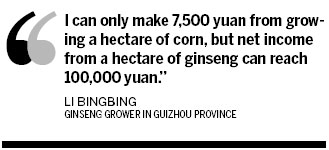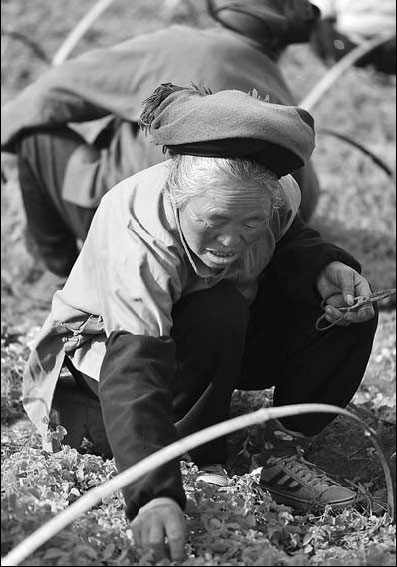Man helps uproot poverty in Guizhou
Updated: 2013-07-18 08:13
By Su Jiangyuan in Yina and Wang Xiaodong in Beijing(China Daily)
|
|||||||||||
|
Farm workers harvest traditional Chinese medicine herbs in Weining county, Guizhou province. Wu Min / for China Daily |

When agrotechnician Li Bingbing found success growing traditional Chinese ginseng in Northwest China in the 2005, he never imagined he'd be able to repeat that prosperity in his impoverished hometown in Guizhou province.
"There was no road linking (cities) to the village before 2011 and villagers rarely left the village, except when they had to walk for more than 10 kilometers to a nearby town to sell their crops for salt," said Li during a regular checkup of his 15-hectare farm in Wuxing village last week.
Li, 42, earned 25,000 yuan ($4,073) a year in Wenxian county, Gansu province, growing ginseng. His hometown of Wuxing is thousands of kilometers away and until recently, he said it was not a good place for any type of business.
In the late 1990s, Li migrated to Gansu province with his wife and two children because of what he called Wuxing's "barren lands". He said the village at the time could barely sustain a family of four.
"I thought I would live in Gansu permanently," he said.
But when the Guizhou provincial government started a pilot program in 2011 to develop green industries and stem poverty in Yina township, which has jurisdiction over Wuxing village, Li was lured back.
Two years ago, one out of every four people in Guizhou, which at the time had a population of 40 million, lived below the national poverty line, making it one of the most impoverished regions in China.
Li said that when he heard the Yina government was offering assistance to farmers, he wanted "to have a try". He returned to Wuxing carrying ginseng seeds and began planting them as an experiment.
It turns out the barren land was ideal for the crop. "I can only make 7,500 yuan from growing a hectare of corn, but net income from a hectare of ginseng can reach 100,000 yuan," he said.
Li established a cooperative community to plant ginseng. The community has thus far planted ginseng across 370 hectares of farmland and incorporates 1,047 rural households.
Agriculture is now thriving in Wuxing and more cooperatives have been established to grow other agricultural products such as tobacco.
Ecological protection remains a priority to prevent the developing agriculture from harming the environment, said Yang Xingyou, Party chief of Weining county.
Since 2011, Yina has spent more than 30 million yuan in ecology, said Mu Chunlin, township head of Yina. Forest land has increased from 26 percent in 2010 to 38.2 percent last year, he said.
As a major step to promote ecological civilization in Guizhou, an international forum on the topic will be held in Guiyang, capital of Guizhou province, from Friday to Sunday.
Officials, scholars and entrepreneurs from around the world will discuss topics including how to develop a green economy at the only international forum with ecological civilization as its theme to be held in China.
Contact the writers at sujiangyuan@chinadaily.com.cn and wangxiaodong@chinadaily.com.cn
(China Daily 07/18/2013 page5)
